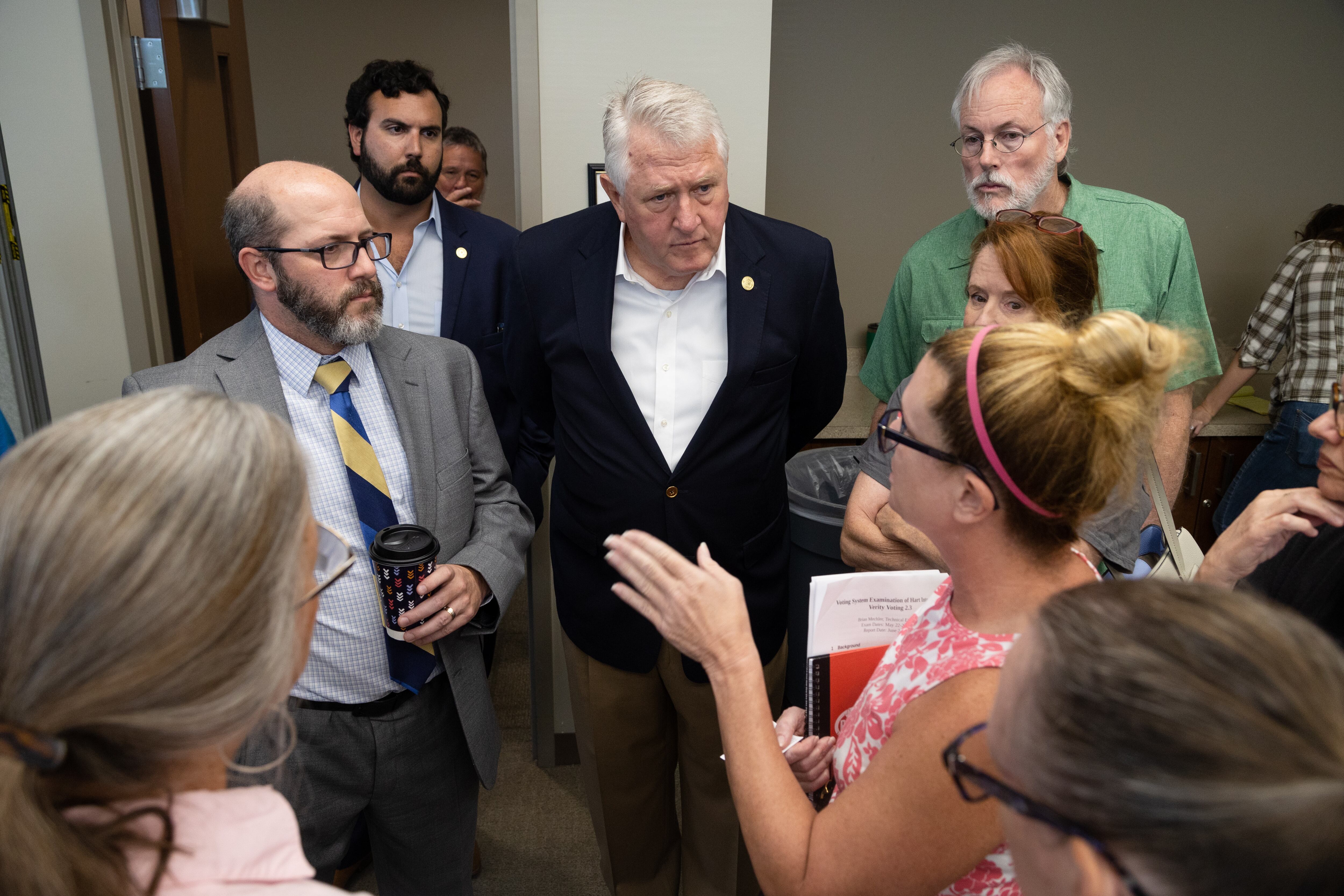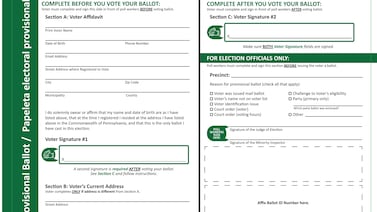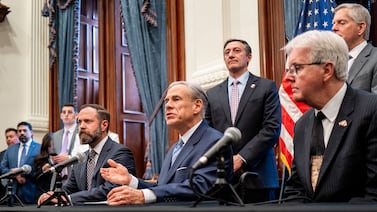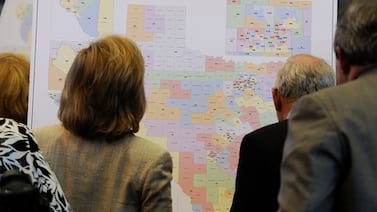When John Scott was appointed Texas secretary of state last year, he decided from the start he wanted to do things differently: He would focus his efforts on elections — perhaps the office’s most tedious and contentious responsibility. Until Scott, the secretary’s role as chief elections officer had historically come second to other parts of the job, such as economic development or the state’s relationship with neighboring Mexico.
Now that he’s announced his end-of-year resignation, that shift might be the most lasting piece of his legacy.
“I think that is the future,” Scott told Votebeat. “I don’t know that there will ever be a moment left in our lifetime where we go back to the role of the Texas secretary of state with a top priority other than elections.”
Over the past year, Scott made time to meet one-on-one with more than a dozen county election officials — all of Texas’s major counties, along with Potter, Parker, and El Paso counties. It was necessary, he said. When he started, he had only a fleeting understanding of elections, pulled largely from his experience arguing election cases as deputy attorney general from 2012 to 2015. Quickly, Scott learned that their work begins several months ahead of Election Day. He saw the number of hours it takes to train poll workers and to manage complicated logistical problems such as ordering the right amount of ballot paper for every election, where to store it, and how to distribute it.
And when critics questioned him personally, or questioned the credibility of those same election officials he’d gotten to know well, he publicly defended them and the safety and accuracy of the election process.
In Texas, the secretary of state is relatively weak and administrative — appointed rather than elected, responsible for an odd collection of priorities, and with little power to make policy. But the secretary of state has a voice that can resonate with the public, and Scott wasn’t afraid to use it.
“We are following state law,” Scott told a dozen or so mostly elderly election fraud activists who disrupted a public test of voting machines in a central Texas county in September.
“No you’re not,” they shouted back at him nearly in unison, insisting, “we oughta get rid of the machines,” and “In France they do 100% paper.”
“I don’t know enough about France, but let me tell you this: I love how our state does this, and the people who I work with on a daily basis and the workers I’ve met throughout the state all have one goal, and that is to have safe and secure elections,” Scott firmly told the crowd.
Texas elections administrators say he’s the first secretary of state in years they have seen take this kind of approach to the role, and his engagement has made a difference.
The midterm’s stakes made Scott’s willingness to defend local officials all the more useful, said Chris Davis, Williamson County election administrator. “He came in at the right time,” said Davis. “He had our back.”
Jennifer Doinoff, Hays County elections administrator, described Scott as “the authority of the elections office. What he does and says does carry a lot of weight with a lot of people.”
“Secretary Scott came at a time when we were experiencing this extreme scrutiny and distrust in the system. He did a great job of showing the public why they can have confidence,” Doinoff said. “We’re able to keep these [election fraud activists] groups at a minimum because of his engagement with the public.”
Scott took office at a time when relationships between local elections administrators and state lawmakers were at a low point — the Legislature had just passed SB 1, an overhaul of state election law, which some county officials saw as unnecessary and harmful. Remi Garza, Cameron County elections administrator, said Scott opened new “lines of communication” that may not have resulted in legislation but helped patch the relationship.
“He had an authoritative voice that was respected by legislators and election officials,” Garza said.
As election conspiracy theorists continue to scrutinize elections and the people who run them continue to be under a microscope, having a secretary of state willing to learn first-hand how elections work, support the work election officials do and learn the different needs of each county will continue to be critical, election officials said.
Scott’s last day is set for Dec. 31. Then, he says, he’ll return to private corporate law practice in Fort Worth, which is what he had been doing just before Abbott appointed him to the statewide position.
During that period, Scott briefly represented former President Donald Trump in a lawsuit challenging the 2020 election results in Pennsylvania. But he told Votebeat he doubts he’ll take on such election challenges in the future. “I can’t imagine a scenario in which I get involved in election law again. I’ve had a lifetime worth of election law packed into 14 months,” Scott wrote in a text message.
While secretary of state, Scott presided over five statewide elections and worked on a voter education campaign featuring videos dubbed “SOS 101.” In the videos, Scott explained steps in the election process such as how to register to vote and how to vote by mail in Texas.
But Scott told Votebeat that when he agreed to take the job, his plan was never to make it to confirmation by the Texas Senate, which has been in recess since before his appointment. His goal instead, he said, was to complete the audit of the 2020 general election, which included the state’s four largest counties.
“The mission was to get the audit done, to create the forensic audit division, to fight fiction with fact and get through this election,” Scott said. “And I think those things have been accomplished.”
The first phase of the audit, released last year, found no evidence of widespread fraud that could have affected the election outcome. The final results of the audit are expected to be released before his last day in office.
A day after Scott announced his resignation, Gov. Greg Abbott announced plans to nominate retiring State Sen. Jane Nelson to the role. Although Nelson hasn’t been involved in state elections, election administrators say they’re looking forward to having her step into the role. Nelson, a North Texas Republican, has 30 years of experience in the Legislature and was the first woman to lead the state’s finance committee.
“Quite a few election bills have been prefiled, and I think someone like her, who has been in the Senate and understands the finance side of things and how legislation works, will be beneficial to elections,” said Trudy Hancock, Brazos County elections administrator and president of the Texas Association of Elections Administrators.
Scott said he hopes close contact with election administrators will continue to be a priority for Nelson. This has become an increasingly common best practice among secretaries of state across the country over the past several years.
“And it works both ways. When there’s an issue in a location, being able to reach out to those [election officials] and know that you’re getting a straight answer from them,” Scott said.
In the past few years, as scrutiny of elections has increased, the role of election administrators has changed and become more public-facing. That’s also true for the role of the secretary of state in Texas, Scott said.
Scott said he did his best to answer questions from critics and explain how the process works. Nonetheless, he wasn’t spared from the death threats and harassment election officials have faced since 2020.
Nelson, with her decades of experience as a politician in Texas, is uniquely equipped and positioned to respond to any kind of criticism that may come her way, Scott said, and allow her to more easily navigate the Legislature.
“She has the kind of a history and experience that will keep [legislators] from questioning what she says,” Scott said. “And so when she says something, they will believe it, and I think that’s going to be what’s really great about this legislative session and our next Secretary of State.”
Natalia Contreras is a reporter with Votebeat in partnership with the Texas Tribune. Contact Natalia at ncontreras@votebeat.org







